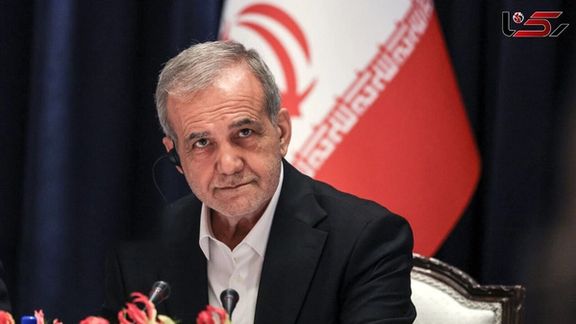Iranian social media users compared Pezeshkian’s call for mutual disarmament between Iran and Israel to former Soviet leader Mikhail Gorbachev, suggesting that Pezeshkian is attempting to trigger the decline of the Islamic Republic, much like Gorbachev did with the Soviet Union.
Others, mostly loyalist hardliners in Tehran, have gone as far as calling for Pezeshkian’s impeachment and removal upon his return to Tehran. On Wednesday, thousands of Iranian social media users trended the hashtag #Pezeshkian's_Impeachment in Persian.
The hardline newspaper Kayhan which is close to Supreme Leader Ali Khamenei's office used strong words in condemning Pezeshkian and Foreign Minister Abbas Araghchi for their remarks in New York. In a commentary headlined "Pezeshkian's uncalculated remarks, who is advising the President," the Kayhan wrote that Pezeshkian's comments were surprising and played into the hands of international and regional media.
After arriving in New York, Pezeshkian held a closed-door meeting with American reporters and columnists. Following the meeting, reports surfaced claiming he had suggested mutual disarmament if Israel agreed to do the same. While his foreign minister quickly denied these claims, Iran International obtained an audio file of the meeting, confirming that the Iranian president had indeed made those remarks.
Pezeshkian said, "We are prepared to give up all our weapons, provided Israel also disarms, and an international organization steps in to ensure security in the region. We don't even need them—we know how to secure our own safety."
Kayhan criticized Pezeshkian's remarks as a "slip of the tongue" and faulted him for his inability to deliver effective speeches. Kayhan argued that these comments could be interpreted as Iran recognizing Israel, contradicting the principles of the Islamic Republic’s founder, Ruhollah Khomeini, and Supreme Leader Ali Khamenei.
The daily went on to advise Pezeshkian to dismiss his current advisers, particularly those behind the 2015 nuclear deal—presumably Vice President Mohammad Javad Zarif, Foreign Minister Abbas Araghchi, and Deputy Foreign Minister Majid Takht Ravanchi. Kayhan accused these individuals of lacking a proper understanding of international relations.
Meanwhile, the IRGC's daily newspaper Javan also harshly criticized Pezeshkian and called him a poor speaker and repeated Kayhan's accusations about his advisers. "Those who brokered the nuclear deal are saying that they will remain in New York for a few days after Pezeshkian leaves on Wednesday and try to pretend that they can have some achievements during those few days."
Javan quoted Pezeshkian's statement and sharply criticized both him and his advisers. The hardline newspaper condemned the idea of disarmament, taking aim at the presidential team for suggesting that after Iran and Israel lay down their arms, “an international organization can restore security in the region, although even that is not necessary." The paper directly blamed his advisers, holding them responsible for what it labeled a "shambolic statement."
Meanwhile, another hardline daily, Hamshahri, published by the Tehran Municipality, praised Pezeshkian as "The Voice of the Oppressed Palestinians" and commended the Iranian delegation's diplomatic efforts to build a consensus against Israel in New York. However, the paper did not specify which countries were aligned with the Islamic Republic in this so-called "consensus."
Ironically, the reformist daily Etemad, whose managing editor Elias Hazrati, acting as the government's News Dissemination Chief, had denied Pezeshkian's comments on Tuesday, ran a commentary titled "We are prepared for negotiations." The piece largely contradicted Hazrati’s stance as a state official. Critics had already flagged a potential conflict of interest when Hazrati was appointed to the post earlier in the month.
Ali Khamenei, the ultimate decider in Tehran, has remained silent on Pezeshkian’s visit to New York, likely giving him some leeway to portray the Islamic Republic as a reasonable regional power. Pezeshkian’s presidential campaign and post-election statements have consistently emphasized that lifting US economic sanctions is a top priority for a state facing both a serious economic crisis and the threat of war with Israel.







